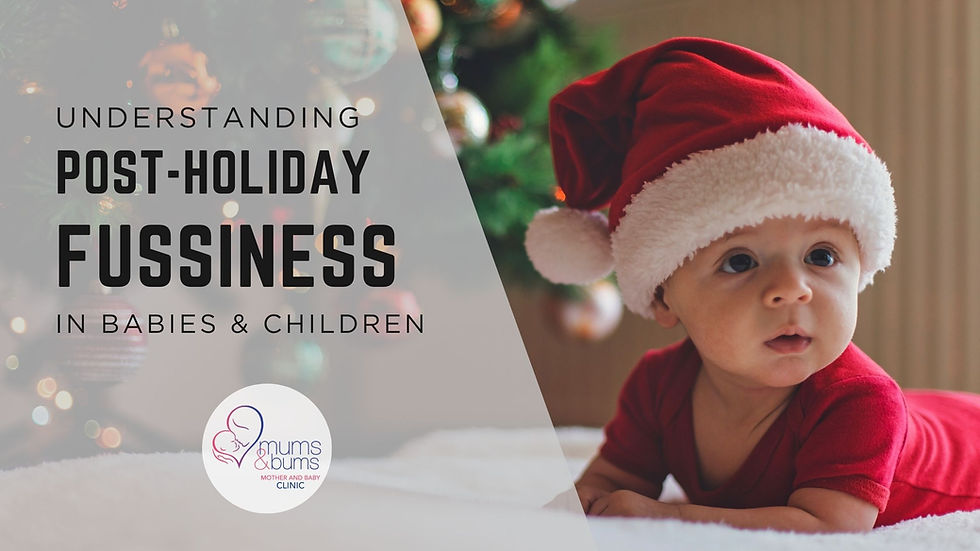Can a Baby Drink Water Under 6 Months? Risks Explained by a Nurse
- Samantha Pieterse

- Feb 18, 2024
- 5 min read
Updated: Sep 11, 2025

As a nurse who works with little babies daily and a mother of two young children, one of the most important messages I can share with you is the dangers associated with giving water to a baby under the age of 6 months. This is really a question that I get quite often, and it is something that is SO important to understand.
While it may seem harmless or even beneficial to give water to a thirsty or fussy infant, the reality is quite different.
💧 When can babies drink water? It might seem harmless or even helpful, but giving water to a baby too early can be risky, and in some cases, even dangerous. Their kidneys are still developing, and even small amounts can cause water intoxication and fill their tummies without nutrients. From around 6 months, once solids are introduced, a few sips of water with meals are safe.
I totally understand why it’s confusing. So in this post, I’ll walk you through:
Why babies under 6 months don’t need water
The health risks (some of them surprising!)
What to do instead if your baby seems thirsty or fussy
Why Water Isn’t Safe for Babies Under 6 Months
First and foremost, it's super important to understand that breast milk or formula provides all the hydration a baby needs during the first six months of life. Both breast milk and formula contain the perfect balance of nutrients, including water, to keep your baby happy, hydrated, and nourished. Introducing water too early can actually disrupt this balance and potentially harm your baby's health.

Risks of Giving Water to a Baby Under 6 Months
Risk of Malnutrition:
Giving water to a young baby can fill their tiny stomachs without providing any essential nutrients. This leads to a lower intake of breast milk or formula. Think of it this way: a baby’s tummy is full of fluid that has no fat or nutrients. They think they’re full, but they haven’t really received any of what they need. This can result in malnutrition and failure to thrive, as water does not contain the essential fats, proteins, vitamins, and minerals necessary for healthy growth and development.
Water Intoxication:
Your baby's kidneys are not fully developed during the first few months of life, making it almost impossible to process water effectively. Overhydration, also known as water intoxication, can occur when a baby consumes too much water, leading to a dangerous electrolyte imbalance. Think: when you have a stomach bug and all the good stuff is washed out, you usually pick up a Rehydrate or a Powerade to replace these electrolytes. This imbalance can cause symptoms such as lethargy, seizures, and even life-threatening complications like cerebral edema (swelling of the brain).
Reduced Breastfeeding or Formula Feeding:
Offering water to young babies may cause them to nurse or bottle-feed less frequently, resulting in decreased milk production for breastfeeding mothers or reduced formula intake. This can compromise the baby's nutrition and overall health, as breast milk or formula is the primary source of calories and nutrients for infants.
Long-Term Effects of Giving Water Too Early
The risks of giving water to babies under 6 months extend beyond immediate health concerns. Parents should be aware of the potential long-term consequences, including:
Reduced weight gain and growth
Increased risk of infections and illness due to inadequate nutrition
Developmental delays and cognitive impairment
Electrolyte imbalances leading to seizures or other neurological complications
Disruption of breastfeeding or bonding between parent and child

What to Give Your Baby Instead of Water: Safe Hydration Tips
So, what should you do if your baby seems thirsty or fussy between feedings? Instead of offering water, here are some alternative strategies to help keep your baby comfortable and hydrated:
Breastfeed or offer formula on demand: Breast milk or formula should be the primary source of nutrition and hydration for infants under 6 months. Feed your baby whenever they show hunger cues, such as rooting, sucking on fists, or crying.
Increase breastfeeding frequency: If your baby seems thirsty or fussy, try offering more frequent breastfeeding sessions to provide additional hydration and comfort.
Offer a dummy: Sometimes, babies may suck for comfort rather than hunger or thirst. Offering a dummy can help soothe your baby without the risk of overhydration.
Monitor nappy output: Monitor your baby's wet nappies as a sign of adequate hydration. A well-hydrated baby will typically have six or more wet nappies per day.
Consult a healthcare provider: If you have concerns about your baby's hydration or feeding habits, don't hesitate to contact your healthcare provider or a lactation consultant for guidance and support.
Final Thoughts: Can a Baby Drink Water?
Giving water to babies under 6 months of age poses serious risks to their health and well-being. Breast milk or formula provides all the hydration and nutrients your baby needs during this critical stage of development. By following the alternative feeding recommendations that we discussed, you can ensure that your baby stays healthy, hydrated, and thriving. As always, prioritize your baby's safety and consult with us if you have any questions or concerns about your baby's feeding practices.

Baby Water FAQs: What Parents in South Africa Need to Know
Why can’t babies have water?
Babies under 6 months can’t process water properly because their kidneys are still developing. Even small amounts can dilute the sodium in their blood (water intoxication), which affects how the brain and body work. Water can also fill their tiny stomachs, leaving less room for breast milk or formula, which should be the only sources of hydration and nutrition at this age.
When can babies drink water?
In South Africa, paediatric guidelines are the same as international ones: no water before 6 months. Breast milk or formula is enough, even in hot weather. Babies can start sipping small amounts of water from 6 months, usually with meals as they begin solids. From 12 months, they can drink water freely. Babies younger than 6 months should not drink water.
What happens if I accidentally give my baby water?
If your baby only had a sip or two, they will likely be fine, but watch closely for warning signs like irritability, unusual sleepiness, or fewer wet nappies. If your baby drank a larger amount or if you notice concerning symptoms, contact your doctor immediately.
How can I tell if my baby is dehydrated?
Signs of dehydration in babies include fewer than six wet nappies a day, dry lips, no tears when crying, or unusual lethargy. If you notice these, seek medical advice quickly. Never try to correct dehydration with plain water at this age.
What should I do if my baby seems thirsty in hot weather?
On very hot days, offer breastfeeds or formula more frequently. Babies under 6 months don’t need plain water. Extra feeds provide both hydration and nutrients. If your baby is unsettled, offering a dummy or skin-to-skin comfort can also help.
Ready for More Baby Tips?
👉 Bookmark this guide or share it with a new parent friend
📞 Have questions? Contact us or visit your local baby clinic
📱 Follow us on Instagram @mumsandbumsclinic for baby advice
Book a baby check-up at Mums & Bums in Centurion. We can guide you through safe feeding, hydration, and growth milestones.



















I really didn't know this. Wow!